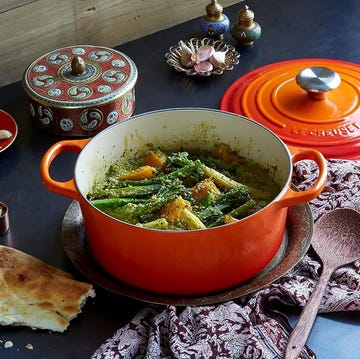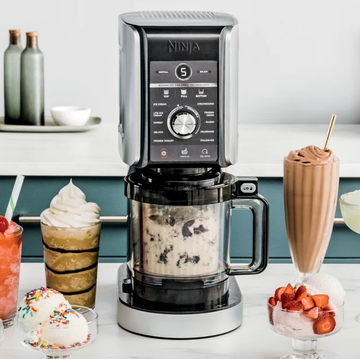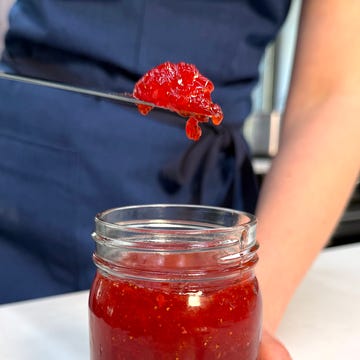All of us, at some point, have run into a butter dilemma. You reach into the fridge looking for butter only to be met with options: salted, unsalted. Can they be used interchangeably? Or, perhaps, a recipe calls for unsalted butter and you only have salted. Is there really a difference? You don't want all your effort on that birthday cake to go to waste just because of butter!
To save all of your future baked goods and lay this question to rest, we went to the experts. Meg Walker, CEO and executive chef of Made by Meg Catering, Chef Kim Canteenwalla, principal and managing director of the Blau + Associates restaurant group, and Delish Senior Food Director Robert Seixas shared their insight on the two different types of butter and what you really need to know about using one vs. the other.
What's The Difference Between Salted And Unsalted Butter?
The main difference between salted and unsalted butter is, you guessed it, salt. For this reason, one is often suited for cooking and baking, while the other is more suitable as an accompaniment.
"Unsalted butter has long been hailed as the superior butter in all applications in the kitchen," says Walker. The main reason is simply that it has no salt. "When you use salted butter, it combines two ingredients in a ratio that you can't control," she says. "Need a cup of butter? Then you are automatically getting all the salt that comes in that cup of salted butter."
Salted butter typically contains around 1.5% sodium by weight, according to Seixas. However, he points out that “a food is considered properly seasoned—salted—at around 2% of its weight.” This means that even if you’re using salted butter, your end product may still need additional salt.
Additionally, Seixas explains that salted butter has a unique manufacturing process where salt is added early on. This ensures the salt dissolves evenly throughout the butter, making it taste more integrated—similar to seasoning a dish during cooking rather than adding salt at the end. “It’s like the difference between adding salt to a dish at the end of the preparation process versus seasoning it during cooking—the latter tastes better,” he says.
When To Use Salted Butter
Canteenwalla and Walker agree that when it comes to cooking and baking, salted butter is not the way to go because you can't control the amount of salt that will go in the recipe. But salted butter is a great option to use after the cooking and baking process—like slathering on cornbread, blueberry muffins, or freshly baked scones.
"For me, there is nothing better on a fresh loaf of bread than salted butter," says Canteenwalla.
Seixas adds that using salted butter creates a more complex flavor, compared to adding plain butter, followed by salt separately: “Add butter to your bread, hit it with salt—the taste is totally different. It’s a sharp, unincorporated hit of salt. With salted butter, it's much more complex and even.”
More food for thought: “No one would ever say, ‘Please pass the unsalted soy sauce!’ Or, ‘Can I get that salt-free Parmesan, please?’” Seixas points out. “Just about all food contains some level of salt, but there seems to be a fixation on salted butter."
When To Use Unsalted Butter
"As a chef, I don't believe a salted butter is ever better than an unsalted butter," says Walker. "I want to be in control of the salt content."
Most recipes, especially for baked goods, call for unsalted butter for that very reason. "When baking or cooking, the only choice for me is unsalted," says Canteenwalla. "There is no need to have salt in the butter; it gives you better control over your recipe to add the salt and seasonings yourself."
Even when making flavored butter like garlic butter and Tuscan butter, we recommend starting with unsalted butter as the base. "Unsalted butters are the purest butter ingredient that a chef can add to a dish," Walker says.
Additionally, the sweet cream flavor of unsalted butter is important for some baked goods, according to advice on the Land O Lakes website.
Can You Use Salted & Unsalted Butter Interchangeably?
Seixas emphasizes that while salted butter can complement certain foods beautifully due to its integrated flavor profile, it’s not necessarily interchangeable with unsalted in recipes where precise control over seasoning is required.
However, "In a pinch, using either salted or unsalted butter is a possibility," says Walker. "Just remember to back off the salt when you use salted butter!" In this scenario, you'll want to taste and salt as you go to avoid ending up with an overly salty dish. This also depends on whether you're cooking or baking, of course, as you can't realistically taste as you go when you're baking.
And if you're prone to kitchen dilemmas, make sure to bookmark our list of baking ingredient substitutions.













